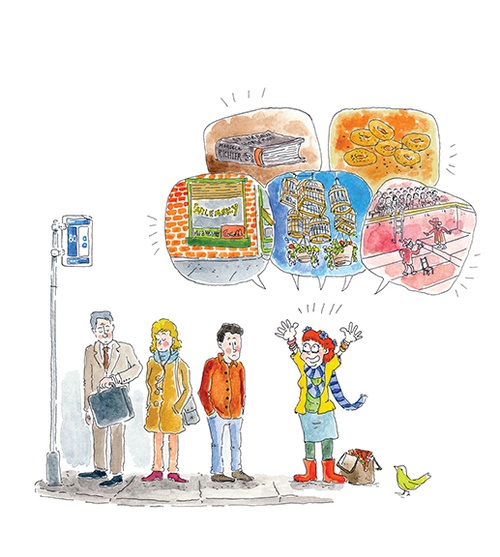 Illustration by Michel Hellman.
Illustration by Michel Hellman.
Letter from Montreal: A Mile End Beginning
I’d just moved, and newcomer logic dictates that you never say no to anything.
THE FIRST THINGS I NOTICED about her
were the strips of blue fabric tied into her coppery hair—I’d never seen
someone who actually looked like their
head was aflame. She was crouched on
the ground, the rosin bangles that
lined her wrists clattering against the
pavement. We were both waiting for
the 80, the public bus that runs up
and down Parc Avenue. It was a sunny Saturday afternoon; the bus should
be just another couple of minutes, I
thought, craning my neck and squinting north.
When she stood up, her kohl-rimmed eyes settled on me. She held out her palm. Resting on it were a lock and key, like the kind that come attached to the dollar-store diaries of pre-teen girls. “I’ve found cards and jewelry on the street, but never a lock. And a key!” she said, smiling.
I reached out to take her offering. I’d just moved to Montreal, and newcomer logic dictates that you never say no to anything, even if that something is a willowy middle-aged woman nonchalantly offering you a trinket she’d scraped from the sidewalk. “It’ll be good luck,” she said, before asking where I was from.
Growing up in Toronto, Montreal had always seemed a city of visitors— a mythological place with a European air and impassioned politics, yet somewhere you observe rather than experience, even when you’re participating. A city you traveled to if you wanted to run into Leonard Cohen or Win Butler. A place where flocks of Anglophone university students irritated the permanent residents for four years by pretending to smoke and lazily speaking French before migrating to warmer economic climes. Arriving in March, trekking over the Van Horne bridge in the slush and flat, grey twilight, rusting train tracks below, I saw none of its charm.
Turns out she herself was living in Toronto just then, though she had lived in Montreal for many years and was planning to come back in a few months. She couldn’t quite imagine living anywhere but Mile End. “Everyone wants to live here,” she said, as the 80 pulled up to the curb. I smiled, letting the idea settle around my hesitation. When I got on and took a seat halfway down, she stood in front of me, holding a pole. She began an oral history of the ‘hood, her long striped scarf falling from her neck over and over as she tossed it back with an air of elegance. Had I seen the flower shop with the white bird cages dangling in the doorway, run by a single mom and former beauty queen? Had I eaten at Wilensky’s, the family-run sandwich joint that’d been around for decades? They used to give haircuts but are now open just for sandwiches they make on a grill they’d paid off, a quarter a week, back in the ‘40s. Had I decided which bagel shop I preferred, Fairmont or St. Viateur? She thought I looked more like a Fairmont, herself. Did I know Montreal was immortalized in Richler novels, among others, and was I going to add my own stories to the informal canon? And, most importantly! Had I been yet to see a play in that theatre in an abandoned swimming pool down on Ontario Street? She couldn’t quite recall the name, she said, but if I asked anyone, they’d know what I meant.
“If you live on Hutchison, we’ll be bumping,” she said casually, as she clinked her way off the bus at Pins. I realized I hadn’t asked her name, and I never saw her again. But she was right, about the bagels, the luck, all of it.





